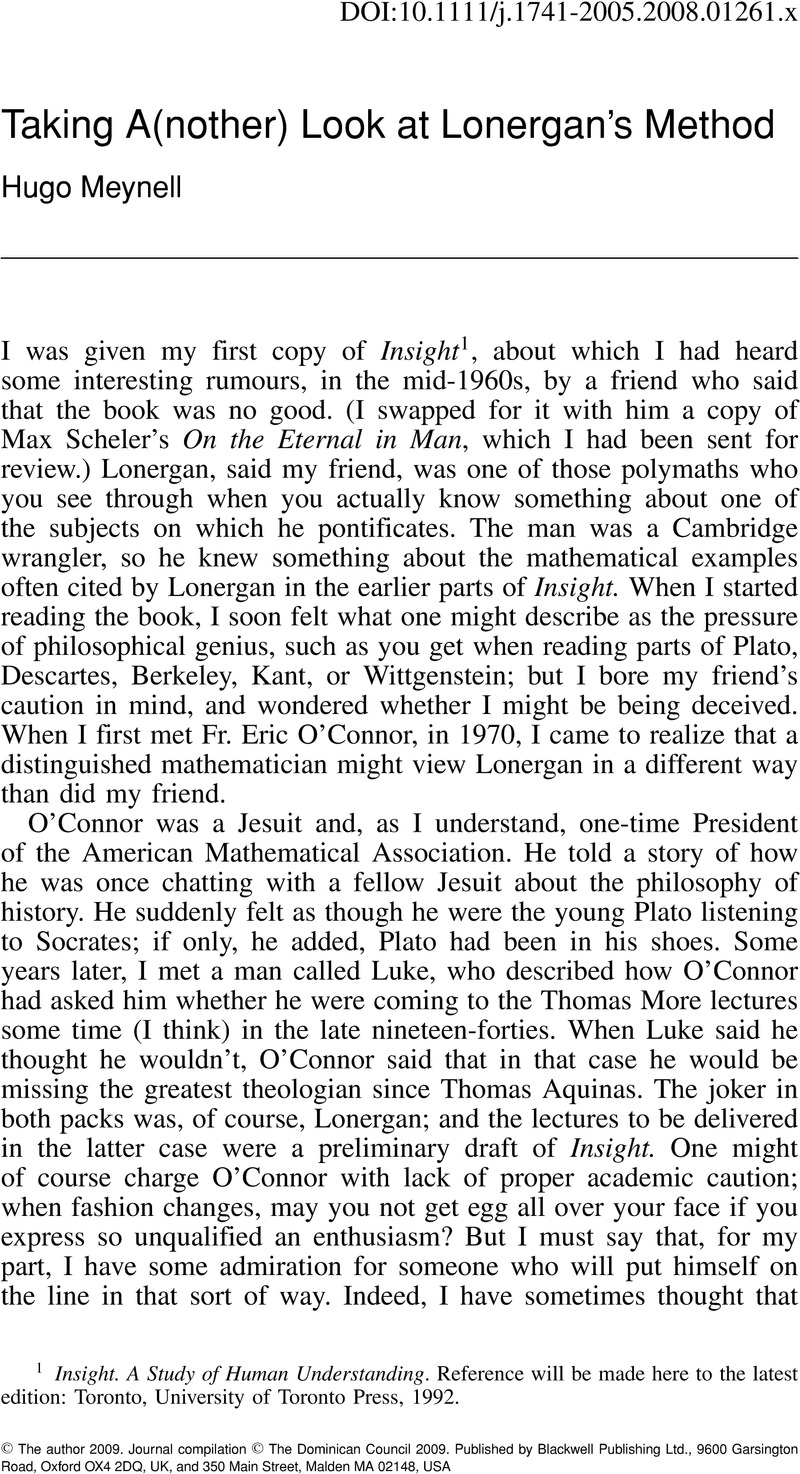Published online by Cambridge University Press: 01 January 2024

1 Insight. A Study of Human Understanding. Reference will be made here to the latest edition: Toronto, University of Toronto Press, 1992.
2 ‘In Defence of Lonergan's Critics’, New Blackfriars, March 1976.
3 Lash, ‘Defence’, 124–5.
4 ‘Lonergan's Awake. A Reply to Fergus Kerr,’New Blackfriars, January 1976.
5 Looking at Lonergan's Method, ed. Corcoran, P.. Dublin, Talbot Press, 1975Google Scholar.
6 Corcoran, Looking, 67.
7 Corcoran, Looking, 80.
8 Cf. Lonergan, Insight, chapters XIX and XX.
9 See note 2 above.
10 Corcoran, Looking, 15.
11 Corcoran, Looking, 72.
12 As one might say that one's friend's political ‘position’ was somewhat to the right of Genghis Khan's; or that a pupil's ‘position’ on abortion changed while she was writing her thesis on that subject. In referring to a ‘position’ in Lonergan's special sense, as contrasted with a ‘counter-position’, I suggest one might coin the term ‘L-position.’
13 Cf. Lonergan, , Method in Theology (London: Darton, Longman and Todd,)CrossRefGoogle Scholar.
14 Lonergan, Insight, chapter XVIII; Method, chapter 2.
15 Lonergan, Insight, chapter XIX.
16 Lonergan, Insight, chapter XX.
17 Lash, ‘Defence,’ 125.
18 Lonergan, ‘System, Common Sense, Scholarship’ (Cultural Hermeneutics I (1973).
19 Lonergan, Method, 101–3.
20 Corcoran, Looking, 34.
21 See Fergus Kerr, ‘Objections to Lonergan's Method’ (New Blackfriars, July 1975); and ‘Beyond Lonergan's Method: A Response to William Mathews’ (New Blackfriars, February 1976). Rather as Anselm once undertook to give Gaunilo his perfect island, so I undertake to give Fr. Kerr his properly-cooked spinach. Fr Kerr writes slightingly of ‘the Platonic metaphysical tradition’ and of ‘the varieties of idealism that continue to dominate’ (‘Objections,’ 318). Certainly Lonergan, who stresses intelligible reality as opposed to sensible appearance quite in the Platonic matter, is guilty on this count. But metaphysics is not now so unfashionable for analytical philosophers as it once was; cf. Beards, A., Method in Metaphysics. Lonergan and the Future of Analytical Philosophy (Toronto: University of Toronto Press, 2007)Google Scholar.
22 Wodehouse, P. G., The World of Mr. Mulliner (New York: Taplinger, 1974), 29Google Scholar. Oxford: Blackwell, 1978, Part I, section 66.
23 See Quinton, A., ‘Extract from Modern British Philosophy’ in Pitcher, G., ed., Wittgenstein. The Philosophical Investigations (London: Macmillan, 1968)Google Scholar. Rorty, Richard, Philosophy and the Mirror of Nature (Princeton NJ: Princeton University Press, 1979)Google Scholar. On Wittgenstein on private language and pain, see Philosophical Investigations (Oxford: Blackwell, 1958), Part I, sections 243–6Google Scholar.
24 See Corr, Charles A., ‘Wolff, Christian’, in the Routledge Encyclopedia of Philosophy (Routledge: London and New York, 1998)Google Scholar.
25 Collingwood, R. G., Autobiography (Oxford: Clarendon Press, 1978)Google Scholar. For Lonergan's alleged confusion of empiricism and rationalism, see William Shea, ‘The Stance and Task of the Foundational Theologian’ (Heythrop Journal, 1976).
26 This expression is due to W. W. Bartley III.
27 Corcoran, Looking, 34.
28 ‘Isomorphism of Thomism and the Scientific Worldview’, Collection (London: Darton, Longman and Todd 1967, 142–151). Cf. 143: ‘(S)cientific hypothesis stands to verification as Thomist definition stands to judgment.’
29 Rahner, Karl, Foundations of Christian Faith (New York: Seabury, 1978), 357–369Google Scholar.
30 This was in effect the position of Melanchthon, who wept over the failure of his attempts to reconcile Catholics and Protestants.
31 John Calvin, Institutes of the Christian Religion, Book II, chapter V.
32 This may sound like a contradiction, but of course is not so, as Aquinas demonstrates. It can be shown, on first principles, that there are good reasons for supposing that there is a God; and for maintaining that such a God might have revealed more of the divine nature purposes for humankind than can be worked out from first principles; and for holding that some particular institution on earth is the source of such divine revelation. What is revealed, again, if not deducible from first principles, may commend itself by its internal coherence, and its appropriateness to our condition. See also Lonergan, Insight, chapters XIX and XX.